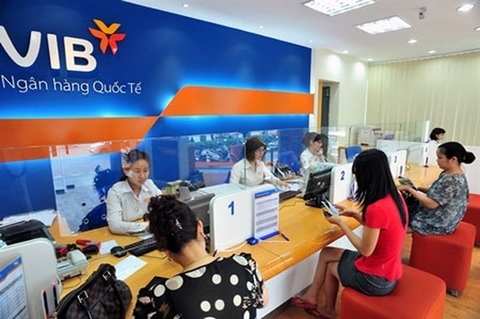Experts emphasise new trends for digital banking in Việt Nam
Experts emphasise new trends for digital banking in Việt Nam
Three key trends of Payments, AI and ESG will be instrumental in accelerating digital banking in Việt Nam, according to banking experts.

Clients conduct transactions at a VIB branch in Hà Nội — Photo baodautu.vn |
Swapnil Deshmukh, Regional Director of Temenos APAC, the global banking industry was buffeted by challenging macroeconomic headwinds in 2023, and a keen focus on resilience and innovation from retail banks is anticipated in response as Vietnamese banks prepare to usher in the Year of the Dragon.
According to Swapnil Deshmukh, digital transformation becomes a key priority as part of the 13th National Congress of the Communist Party of Việt Nam’s 10-year socio-economic development strategy, with Prime Minister Phạm Minh Chính approving the Programme “National Digital Transformation to 2025, with orientation to 2030”. Vietnamese banks will ride on the rise of this awakening force of innovation and leapfrog themselves towards parity with digital banks across the globe.
He mentioned that in Việt Nam, Samsung Pay was launched in 2017 and Google Wallet in November 2022. Last year, Việt Nam was the third country in Southeast Asia to allow Apple Pay, after Malaysia and Singapore.
Việt Nam Government has extended a pilot use of telecom payment accounts for small-value goods and services until December 31, 2024. Việt Nam started the two-year service pilot nationwide on March 9, 2021. The service allows customers to use their telecom accounts to conduct various transactions, including payment for small-value goods and services, money transfer, direct deposit, and withdrawal at outlets and transaction points of telecom providers throughout the country, without requiring a bank account, a smartphone, or an Internet connection.
The Government aims to reduce cash payments to eight per cent by 2025. This presents a massive opportunity for banks to improve their fee income by providing channel-agnostic payment solutions to their customers and merchants as part of their digital channel offerings.
According to Đào Lưu Xuân, Country Director, Temenos Vietnam, 2023 has been the year Artificial Intelligence (AI) came into the spotlight globally. In a recent Global Study, “Byte-Sized Banking,” jointly published by Economist Impact Research and Temenos, as much as 75 per cent of the respondents expect generative AI to impact banking, and more than 70 per cent of survey respondents see unlocking value from AI as a critical differentiator for banks heading into the future. Việt Nam is in an excellent position to seize the moment to utilise AI to enhance the payment experience for both consumers and businesses due to its status as the fastest-growing digital economy in Southeast Asia for the second year running.
The country's digital economy is expected to grow at a compound annual growth rate (CAGR) of 20 per cent. Banks and financial institutions can navigate a competitive market landscape in the financial services industry by using AI to acquire more customers, enhance customer engagement, and optimise operational excellence. AI facilitates quicker credit assessment for consumers and businesses, enabling more reliable and straightforward underwriting and collections. The technology can also expedite fraud detection and protection, improve dispute management processes, and automate financial advisory services.
In addition, Việt Nam is also one of the countries most likely to be affected by climate change, with an estimated loss of US$523 billion, equivalent to 14.5 per cent of GDP by 2050. Therefore, building green finance plays a vital role in sustainable development. The Economist Impact Research study also reveals that customer centricity is driving banks to offer more embedded environment, social and governance (ESG) propositions to their customers (73 per cent), as well as providing capital to environmentally friendly projects (74 per cent). These statistics allude to the emerging market opportunities in this space and potential benefits to companies. In tandem with this global development, Việt Nam also launched an investment framework to finance its transition to a low-carbon economy. As per a PWC report, 88 per cent of companies surveyed in the financial sector have made or plan to make ESG commitments. To rise to the ESG challenge, financial institutions must develop holistic action plans that can address the various scopes required to integrate ESG understanding into all aspects of the organisation. Doing so will help them accelerate their ESG journey.
They conclude that with the key trends of Payments, AI and ESG paving the way for further innovation in Việt Nam, 2024 presents numerous opportunities for the prepared Vietnamese banker. As the Asia Pacific region navigates into a period of lower inflation and lower interest rates, the Asian Development Bank is forecasting a Gross Domestic Product growth of 6 per cent in 2024 for Việt Nam, more than double that of the Global Economy. With the right perspectives and partnerships, Vietnamese banks are well-positioned to capture the opportunities available in the rising Year of the Dragon, and the aspirational “Digital Orientation by 2030” could happen earlier than anticipated.
At Temenos, they are champions of innovation with a partnership with the Monetary Authority of Singapore. They are proud to be able to partner with some of the leading banks across ASEAN to push the boundaries of what technology can do for banking, and are deeply appreciative of the trust that leading Vietnamese banks like LP Bank have with them.
























